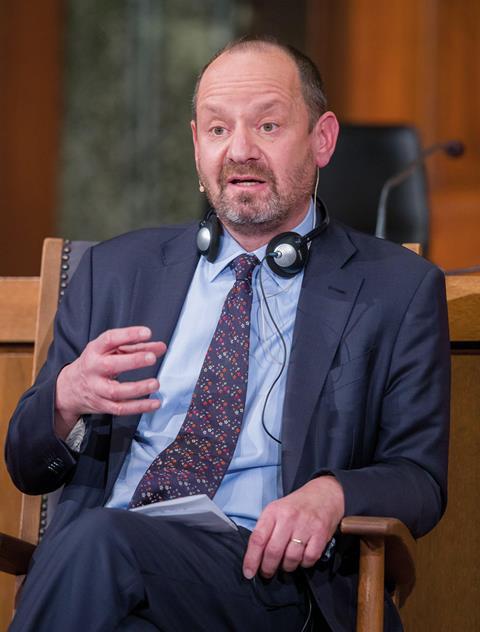A plan to create a new international tribunal that would try Russian leaders for the crime of aggression is gaining traction within the international community.

The idea was suggested by Philippe Sands KC (pictured) shortly after the invasion last year and quickly taken up by Ukraine. As a London-based international lawyer, Sands has a personal interest in bringing Putin to justice: in 1914 his maternal grandfather was forced to flee Lviv, then called Lemberg, when Russian troops captured what is now the largest city in western Ukraine.
But why, I asked him at the time, do we need a one-off tribunal? What’s wrong with using the International Criminal Court (ICC)? After all, its founding statute was amended in 2010 to include the crime of aggression – defined as ‘the planning, preparation, initiation or execution, by a person in a position effectively to exercise control over or to direct the political or military action of a state, of an act of aggression which, by its character, gravity and scale, constitutes a manifest violation of the charter of the United Nations’.

As Sands explained last month in a paper written with the former prime minister Gordon Brown, the ICC cannot exercise that jurisdiction if an act of aggression is committed by a state – like Russia – that is not a party to court’s founding statute. Exceptionally, the ICC can try allegations of aggression if the UN Security Council refers allegations to it. But Russia, as a permanent member, would veto any referral.
So Sands and Brown proposed the creation of a special tribunal for the crime of aggression against Ukraine. It could be set up quickly and hold trials after the conflict ends. As you would expect, the Dutch government has offered to host the tribunal in The Hague. It seems to me that it could easily sit at the ICC’s purpose-built courthouse.
Building on support from the Baltic states and Poland, the European Union has backed the plans. ‘As a first step,’ the commission president Ursula von der Leyen said on a visit to Kyiv this month, ‘an international centre for the prosecution of the crime of aggression in Ukraine will be set up in The Hague. This centre will coordinate the collection of evidence.’
Dominic Raab made no mention of a special tribunal in January when he announced that justice ministers from across the world would be meeting in London next month ‘to increase the global financial and practical support being offered to the ICC and coordinate efforts to ensure it has all it needs to carry out investigations and prosecute those responsible’.
And Rishi Sunak stressed the UK’s continuing support for existing legal structures when the Ukrainian leader visited London last week. ‘One of the things I discussed with president Zelensky this morning,’ the prime minister told MPs, ‘is our support for the work of the International Criminal Court, where, thanks to the efforts of UK members, I am hopeful we will see the first indictments very shortly.’
A week earlier, though, the attorney general suggested that the UK would support a special tribunal. ‘The crime of aggression is one of the most significant in international criminal law,’ Victoria Prentis said in the Commons. ‘At Ukraine’s invitation, we have joined a core group of states to discuss the establishment of a bespoke tribunal.’
That followed an announcement from the foreign secretary James Cleverly on 20 January. He said the UK would ‘play a leading role in a core group of likeminded partners to pursue criminal accountability for Russia’s illegal invasion of Ukraine’. The group would be assessing the feasibility of a so-called hybrid tribunal. This would be a specialised court, integrated into Ukraine’s national justice system but with international elements.
The UK foreign office said that an investigation into the crime of aggression could complement established mechanisms for investigating war crimes, including the ICC and Ukraine’s domestic legal process.
However, Ukraine and other countries remain strongly committed to a freestanding international court – possibly created by agreement between Ukraine and an international body such as the EU or the UN, acting through its General Assembly.
Prosecuting Putin is not without its challenges. Under customary international law, heads of state, heads of government and ministers of foreign affairs enjoy personal immunity for their actions while in office. Once they leave, that immunity continues for acts committed in their official capacity – but arguably not if they are brought before an international tribunal.
Sands told me this week he thought a special criminal tribunal for the crime of aggression would be established soon. Though the tribunal’s relationship with the ICC was still to be decided, confirmation that the crime of aggression was not a dead letter would be a most important development. As he said, ‘this is the only crime that can reach Russia’s top table’.
This article is now closed for comment.































6 Readers' comments